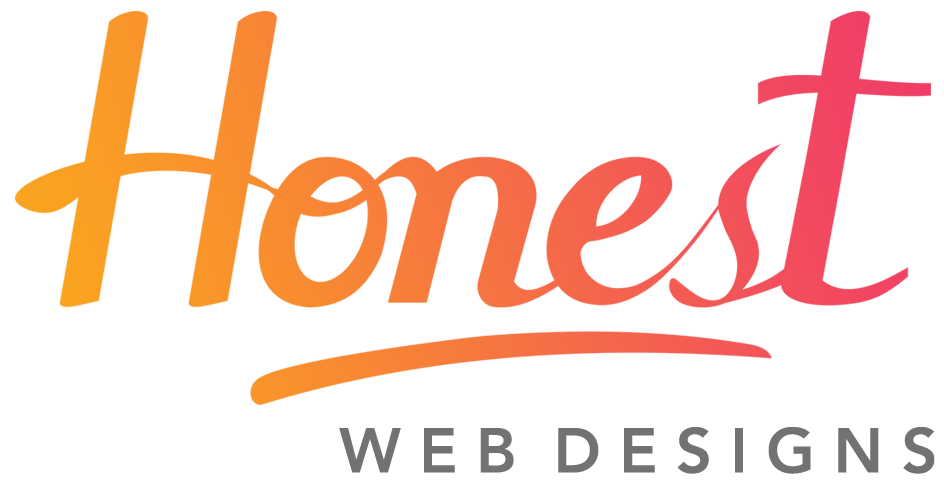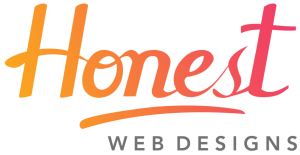As we set out to decipher the labyrinth of CMS systems, we are confronted with the task of identifying the 15 best options available today and unraveling the intricate process of choosing the most suitable one.
The landscape of CMS platforms is vast and ever-evolving, presenting us with a myriad of choices and considerations. Amidst the plethora of options, we aim to navigate the complexities and uncover the key factors that will guide us towards the ideal CMS solution.
But how do we discern the best among the multitude of CMS systems? What criteria should we prioritize, and how do we ensure that our selection aligns with our specific needs and goals?
Understanding CMS and Website Builders

When it comes to developing a website without coding, understanding the distinction between CMS platforms and website builders is crucial for making informed decisions.
CMS platforms offer more control over design, multimedia integration, content organization, and code editing, while website builders provide ease of use and pre-designed templates.
For users desiring liberation from technical complexities, website builders may seem appealing due to their simplicity and convenience. However, for those seeking advanced functionality, customization options, and scalability, CMS platforms are the ideal choice.
By considering specific needs, goals, ease of use, customizability, security, pricing, and prevalence in the market, individuals can make confident decisions when selecting the right tool for their website development journey.
Embracing the power to create and manage a professional website without coding is within reach through a comprehensive understanding of CMS platforms and website builders.
CMS Vs. Website Builders
We will compare CMS platforms and website builders to determine the best option for creating a custom website without coding.
CMS platforms, such as CMS Hub by HubSpot, offer advanced features, customization options, and control over design, content, and code. They're ideal for larger and more complex sites, providing scalability as businesses grow.
On the other hand, website builders like Wix prioritize design, content creation, and quick development, making them suitable for image-rich sites. While website builders handle hosting, maintenance, and security, CMS platforms provide more flexibility and control.
Consider your specific needs, such as ease of use, customizability, security, pricing, and scalability, when deciding between a website builder and a CMS platform.
This comparison will guide you in making an informed decision for your website needs.
Criteria for CMS Selection
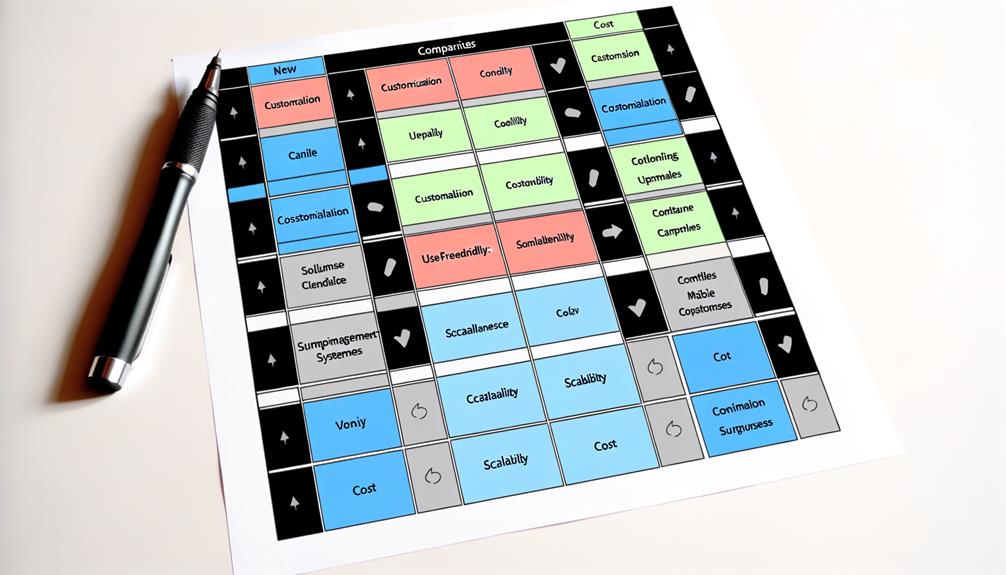
To ensure the successful selection of a CMS, it's crucial to carefully evaluate the platform's ease of use, customizability, security measures, pricing structure, and prevalence in the market.
- Ease of Use: Look for a CMS with a user-friendly interface and intuitive tools for both content creators and developers.
- Customizability: Choose a CMS that offers flexibility and scalability through built-in customization features, extensions, and coding capabilities.
- Security Measures: Prioritize platforms with robust security protocols, regular updates, and essential security add-ons to protect your content and users.
When selecting a CMS, it's essential to consider these criteria to ensure that the chosen platform aligns with your business goals and provides the necessary support for your website's success.
Pricing Considerations
Pivoting from the evaluation of key criteria for selecting a CMS, we now turn our attention to the pivotal factor of pricing considerations when determining the best CMS platform for your specific needs.
When assessing pricing, it's essential to consider your budget and the scalability of the CMS. Many platforms offer different pricing tiers with scalable resources, indicating their ability to grow with your business. Upgrade options are also crucial, showcasing the CMS's potential to accommodate your expanding requirements.
Moreover, it's vital to evaluate the value that each CMS provides in relation to its cost. By carefully weighing these pricing considerations, you can make an informed decision that aligns with your financial resources and liberates you to focus on achieving your business goals.
Market Prevalence Analysis
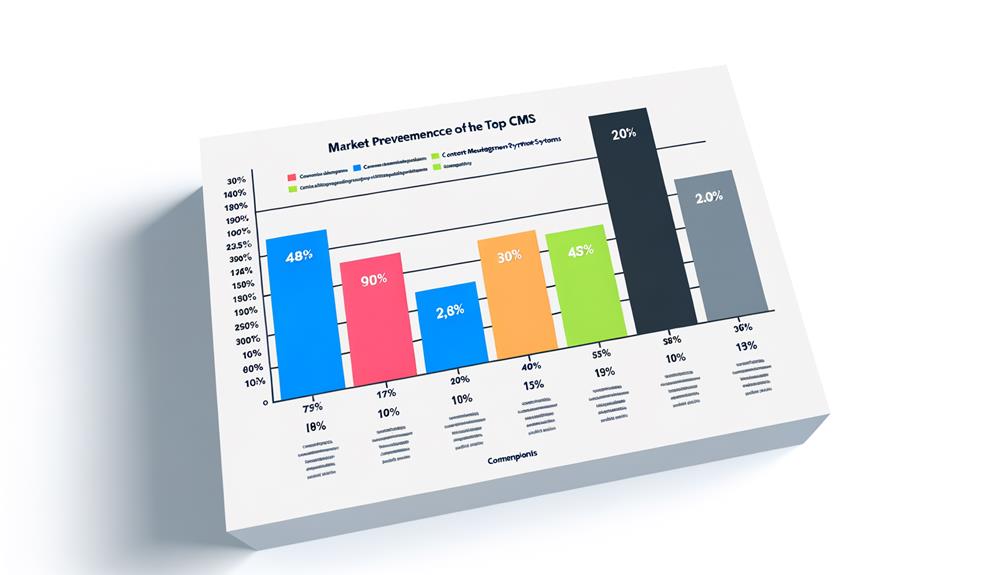
How do successful brands and competitors using a certain CMS impact the decision-making process for selecting the best CMS platform for your business needs?
- Credibility Boost: When prominent brands choose a specific CMS, it signifies the platform's capability to support growth and success.
- Industry Insight: Analyzing competitors' CMS choices provides valuable insights for shaping your own content strategy and staying competitive.
- Platform Value: The prevalence of a CMS among successful brands indicates the value and potential of the platform to meet diverse business needs.
Understanding the market prevalence of different CMS platforms empowers businesses to make informed decisions, aligning their digital presence with successful industry players and leveraging the strengths of widely adopted systems.
CMS Hub Overview
With its comprehensive features and seamless integration with HubSpot's marketing tools, CMS Hub provides businesses with a powerful and adaptable platform for creating and managing optimized websites.
The platform offers user-friendly features for content marketers and developers, including a WYSIWYG editor for quick content creation, modules for easy custom code addition, and built-in customization options to match your brand.
CMS Hub prioritizes site security with robust protocols, manual backups, and 24/7 threat monitoring. It also offers different pricing plans to meet various budgets, with resources that scale up at each price point.
Whether you're a content marketer or a developer, CMS Hub can accommodate your needs and expectations while providing the necessary measures to keep your site safe.
CMS Hub Ease of Use

As we explore the aspect of CMS Hub's ease of use, it's essential to understand how its user-friendly features cater to the needs of content marketers and developers, ensuring a seamless experience in website management and creation.
The platform offers a WYSIWYG editor for quick content creation and editing.
Modules enable developers to add custom code easily.
It's designed to be accessible for all stakeholders on your team, providing a liberating experience for everyone involved.
With these features, CMS Hub empowers teams to work efficiently and effectively, unleashing their creativity and productivity.
CMS Hub Customizability
CMS Hub offers extensive customization options and flexibility, empowering businesses to tailor their websites to match their unique brand identity and evolving needs. The dashboard includes built-in customization features, while extensions and coding options allow for advanced customization.
Pre-designed themes can be easily customized to align with your brand, ensuring a consistent and cohesive online presence. Whether it's adjusting the layout, colors, or adding custom functionalities, CMS Hub provides the tools to bring your vision to life.
As your business grows, the platform can scale alongside your needs, ensuring that your website continues to serve as an effective representation of your brand. With CMS Hub, you have the freedom to create a truly personalized and dynamic online experience for your audience.
CMS Hub Security Features
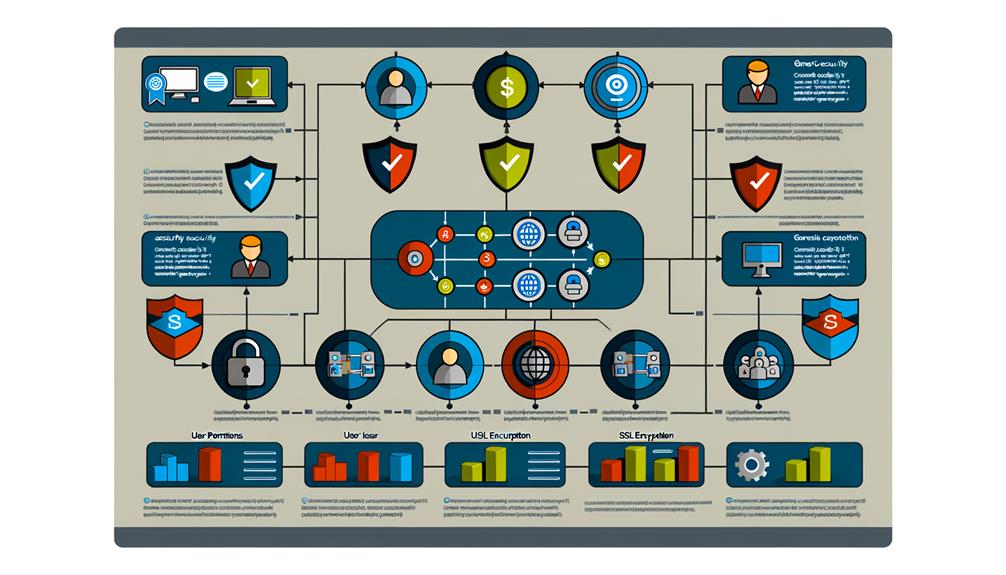
Empowering businesses to tailor their websites to match their unique brand identity and evolving needs, CMS Hub's robust security features ensure the protection of valuable content, users, and visitors.
When it comes to security, CMS Hub offers:
- 24/7 Threat Monitoring: Constant vigilance to identify and mitigate potential security threats.
- Globally Hosted CDN: Accelerated content delivery and protection against DDoS attacks.
- Built-in WAF: A web application firewall to safeguard against malicious activities and unauthorized access.
These features provide peace of mind, allowing businesses to focus on growth without compromising on security.
With CMS Hub, you can liberate your creativity and innovation, knowing that your website and its visitors are protected.
CMS Hub Pricing Plans
With a focus on meeting diverse budgetary needs, our pricing plans for CMS Hub offer scalable resources and comprehensive features to support businesses of all sizes.
Our Professional plan provides advanced functionality, serverless functions, and membership management, starting at $300 per month.
The Enterprise plan offers even more robust features, such as partitioning, activity logging, and single sign-on, with custom pricing based on individual business needs.
Both plans include powerful CRM integration and globally hosted CDN for enhanced performance.
With no setup fees or additional hosting costs, CMS Hub ensures transparent pricing.
Our flexible options enable businesses to choose a plan that aligns with their specific requirements and budget, empowering them to create and manage optimized websites without financial constraints.
WordPress Overview
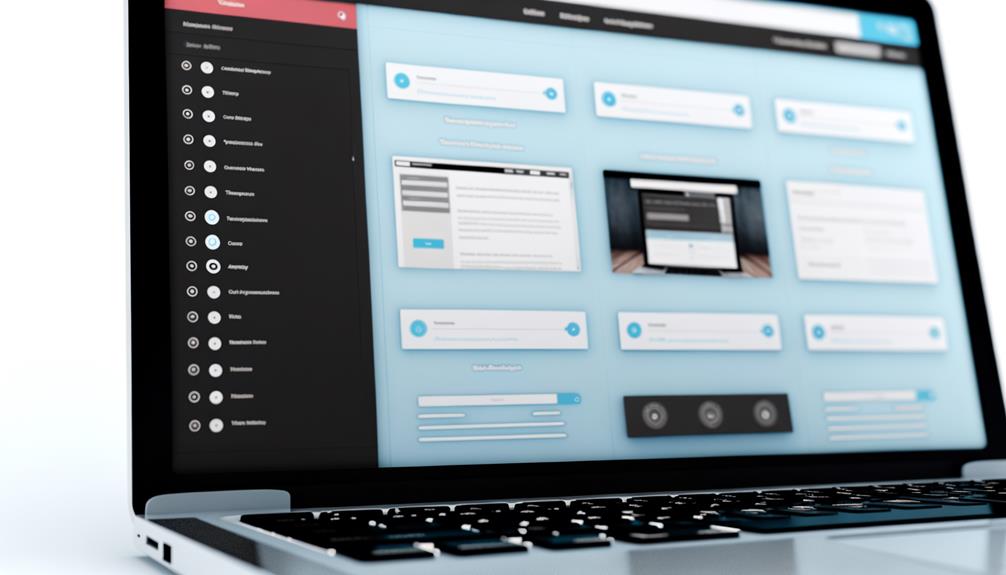
WordPress, a widely recognized and utilized CMS platform, offers a multitude of themes and plugins for effortless customization and content management. It's a popular choice for those seeking liberation in website creation. Here's why:
- Abundance of Themes: With thousands of available themes, users can easily find a design that suits their brand and style.
- Extensive Plugin Options: The vast selection of plugins allows for the addition of various functionalities without the need for coding skills.
- User-Friendly Interface: WordPress provides a straightforward interface for content creation and management, empowering users to take control of their websites.
WordPress's flexibility and user-centric approach make it an ideal choice for individuals and businesses seeking to create and manage their digital presence with ease.
Joomla Overview
Transitioning from WordPress to Joomla, one encounters a distinct platform tailored for membership sites with robust user registration and subscription management features.
Joomla offers a user-friendly interface for content management and provides a cost-effective option for creating membership-based websites. With a range of templates and extensions, Joomla allows for extensive customization to match your brand's identity.
The platform's focus on managing user registrations and subscriptions makes it ideal for building and maintaining a thriving online community. Joomla's emphasis on membership site functionality sets it apart from other CMS platforms, catering to the specific needs of businesses looking to offer exclusive content, gated communities, and subscription-based services.
For those seeking a liberated approach to managing membership sites, Joomla stands as a compelling choice.
Drupal Overview
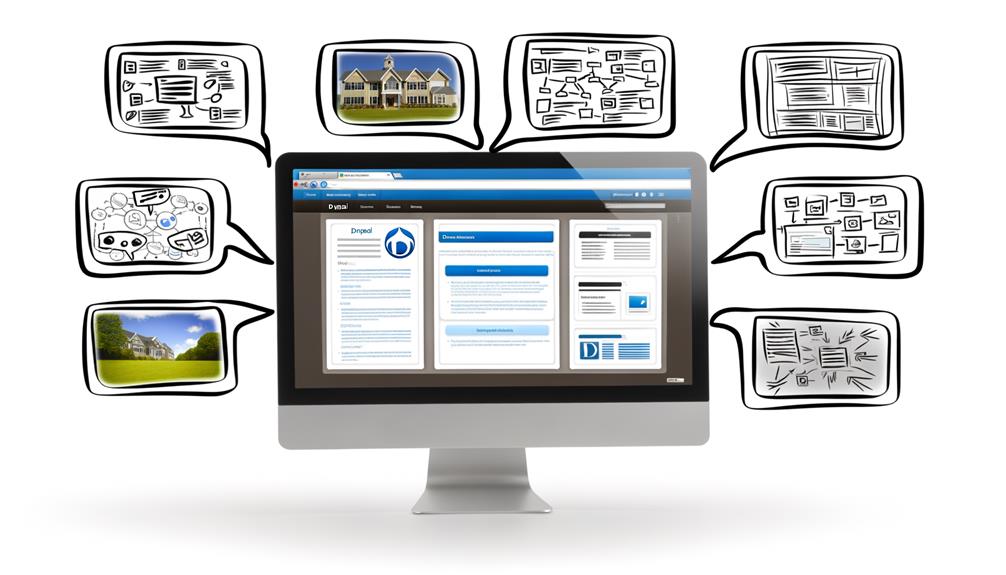
Drupal excels as a robust and highly customizable CMS platform tailored for managing high-traffic sites with extensive data. When considering a CMS, Drupal stands out for its advanced functionality and customization options. It offers flexible content organization through tags and categories, allowing users to easily organize and navigate their content. Additionally, Drupal is known for its reliable performance, making it suitable for complex websites.
Drupal's ability to handle high-traffic sites and extensive data, coupled with its flexibility and reliability, makes it an ideal choice for businesses and organizations seeking liberation from the constraints of traditional CMS platforms.
Wix Overview
Wix, a popular website builder, is known for its intuitive drag-and-drop interface that simplifies the process of creating visually appealing websites. With a wide range of templates and design options, Wix empowers users to bring their creative visions to life without technical constraints. Here's a comparison of Wix with other CMS platforms:
| Feature | Wix | WordPress | Joomla |
|---|---|---|---|
| Ease of Use | Intuitive | User-friendly | Accessible |
| Customizability | Extensive | Flexible | Diverse |
| Security | Robust | Reliable | Secure |
Wix stands out for its user-friendly approach, extensive customization options, and robust security measures. When seeking liberation in website creation, Wix offers the freedom to express creativity without compromising on functionality and security.
Comparative Analysis of CMS Platforms
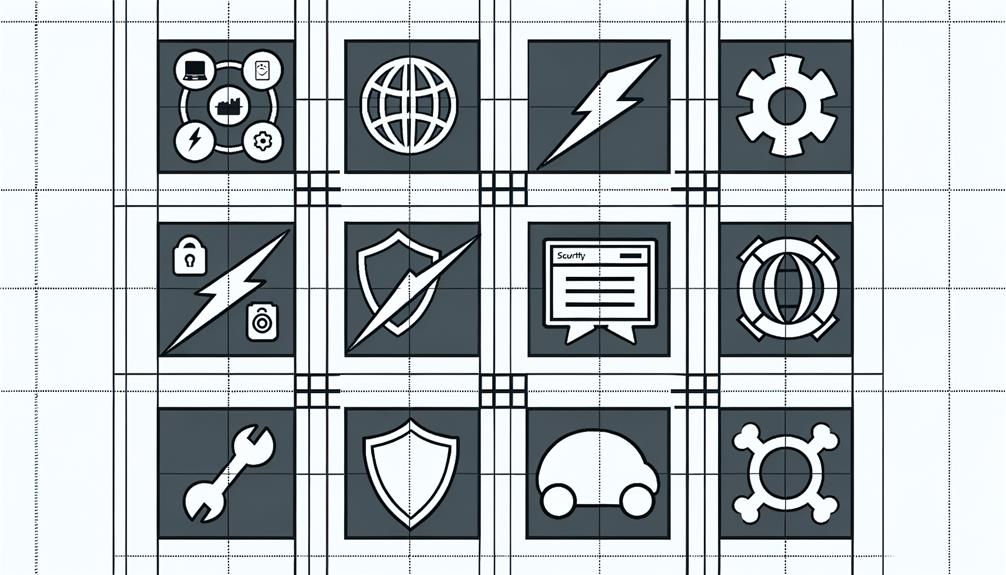
In our analysis of CMS platforms, we aim to provide a comprehensive comparison based on key factors such as ease of use, customizability, security, and pricing, enabling informed decision-making for selecting the most suitable platform for your website needs.
- Ease of Use: We evaluate the user-friendly features and tools that allow for efficient content creation and management.
- Customizability: We assess the extent to which each platform offers customization options, flexibility, and scalability.
- Security and Pricing: We delve into the security measures in place and the pricing structures to ensure a balance between affordability and value.
Frequently Asked Questions
What Are the Most Common Challenges Businesses Face When Migrating From a Website Builder to a CMS Platform?
When migrating from a website builder to a CMS platform, businesses commonly face challenges like content restructuring, design adaptation, and functionality compatibility. Our team has navigated these transitions seamlessly, leveraging robust migration strategies and meticulous planning.
We prioritize user training and support to ensure a smooth shift. Our proactive approach anticipates potential hurdles, enabling a successful migration without disrupting your online presence.
How Do CMS Platforms and Website Builders Impact SEO and Digital Marketing Efforts Differently?
CMS platforms and website builders impact SEO and digital marketing differently.
CMS platforms offer more control over SEO elements like metadata, URL structure, and schema markup. They also allow for advanced content organization and multimedia integration, enhancing digital marketing efforts.
Website builders, while user-friendly, may have limitations in SEO customization.
Choosing the right platform is crucial for maximizing SEO and digital marketing potential.
What Are Some Key Considerations for Ensuring Seamless Integration Between a CMS Platform and Other Business Systems, Such as CRM and Marketing Tools?
When integrating a CMS platform with other business systems like CRM and marketing tools, it's vital to prioritize seamless functionality and data flow.
We need to carefully assess the compatibility of the CMS with existing systems, ensuring smooth integration without disruptions.
How Do CMS Platforms and Website Builders Address Accessibility and Compliance With Web Standards and Regulations?
CMS platforms and website builders address accessibility and compliance by offering features for creating accessible and standards-compliant websites. They provide tools for alt text, keyboard navigation, and responsive design to ensure accessibility. Additionally, they support compliance with standards such as WCAG and ADA.
These platforms prioritize inclusivity and user experience, making it easier for businesses to reach a wider audience and adhere to legal requirements.
What Are the Key Factors That Contribute to the Long-Term Sustainability and Scalability of a CMS Platform or Website Builder?
When considering the long-term sustainability and scalability of a CMS platform or website builder, key factors include:
- Ease of use
- Customizability
- Security
- Pricing
- Prevalence in the market
These aspects impact adoption, content scaling, protection, budget, and potential growth. Evaluating these factors thoroughly ensures that the chosen platform can evolve with your business and continue to meet your needs over time.
Conclusion
In conclusion, our exploration of CMS systems has equipped us with the knowledge and insights needed to make informed decisions.
By considering practical criteria such as ease of use, customizability, security, and pricing, we can confidently choose the right CMS platform for our unique needs.
With a thorough understanding of CMS Hub, WordPress, Joomla, Drupal, Wix, and more, we're empowered to navigate the diverse landscape of content management and make the best choice for our website.

